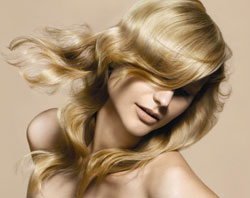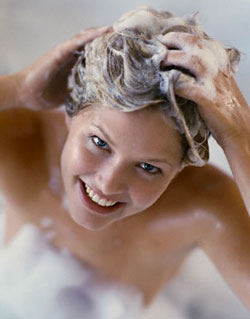|
|
Shampooing With Care
 Shampoos
are designed to cleanse the
hair and scalp,
removing dirt and grime without stripping away too much of the natural sebum.
They contain cleansing agents, perfume, preservatives, and
conditioning
agents that can coat the hair shaft to make the hair appear thicker. The
conditioning agents smooth the cuticle scales so the hair doesn�t tangle, and
help eliminate static electricity from the hair when it dries. Shampoos
are designed to cleanse the
hair and scalp,
removing dirt and grime without stripping away too much of the natural sebum.
They contain cleansing agents, perfume, preservatives, and
conditioning
agents that can coat the hair shaft to make the hair appear thicker. The
conditioning agents smooth the cuticle scales so the hair doesn�t tangle, and
help eliminate static electricity from the hair when it dries.
Shampooing and conditioning is required everyday for straight hair to
maintain a silky,
glowing effect. It is seen that Curly hair
gets more voluminous due to its frequent rinsing, thus, it is good to wash your
hair with shampoo and conditioner in alternative day.
The pH Factor
The letters pH refer to the acid/alkaline level of a substance. It is calculated
on a scale of 1 to 14. Numbers below 7 denotes acidity, those over 7 alkalinity.
Most shampoos range between a pH factor of 5 and 7; medicated varieties have a
pH of about 7.3, which is near neutral.
Sebum has a pH factor of between 4.5 and 5.5, which is mildly acidic. Bacteria
cannot survive in this pH, so it is important to maintain this protective layer
in order to keep the
skin, scalp, and hair in optimum condition.
Many shampoos are labelled �pH balanced�, and this means they have the same
acidity level as hair. Individuals with fragile, permed, or coloured hair should
use a shampoo of this type. However, for strong hair in good condition a pH
balanced shampoo is unnecessary, provided shampooing is followed by
conditioning.
Shampoo Success
 Always use a product formulated for your hair type �
dry, normal,
greasy, or
chemically treated � and before shampooing brush your hair to free any tangles
and loosen dirt and dead skin cells. Use lukewarm water, as hot water can be
uncomfortable. Always use a product formulated for your hair type �
dry, normal,
greasy, or
chemically treated � and before shampooing brush your hair to free any tangles
and loosen dirt and dead skin cells. Use lukewarm water, as hot water can be
uncomfortable.
Wet the hair, then apply a small amount of shampoo and gently
massage
into the roots, using the pads of your fingertips; never use your
nails. Pay
special attention to the hairline area, places where
make-up and dirt
become trapped. Allow the lather to work its way to the ends of the hair. Don�t
rub vigorously or you will stretch the hair.
When you have finished shampooing rinse thoroughly until the water runs clean
and clear. Repeat the process only if you think your hair needs it, again using
only a small amount of shampoo. Finally, blot the hair with a towel to remove
excess water before applying conditioner.
If you suffer from
dandruff,
beware of strong anti-dandruff shampoos. Try an organic product first and if the
problem persists consult your doctor or a trichologist.
Shampoo Tips
-
Use the correct shampoo (and not too much) for your
hair type. If in
doubt use the mildest shampoo you can buy. Dry hair needs a shampoo comprising
of lecithin. Lecithin is present in egg yolk. Under nourished hair needs a
protein based shampoo like egg shampoo. Greasy hair requires a protein based
shampoo embodied with lime, sulphur or cedar base. A mild, non detergent shampoo
is ideal.
-
Don�t wash your hair in washing-up liquid, soap, or other detergents;
 they are
highly alkaline and will upset your hair�s natural pH balance by stripping out
the natural oils. they are
highly alkaline and will upset your hair�s natural pH balance by stripping out
the natural oils.
-
Read the instructions first. Some shampoos need to be left on the scalp for a
few minutes before rinsing.
-
If you can, buy small sachets of shampoo to test which brand is most suitable
for your hair.
-
Never wash your hair in the bath; dirty bath water is not conducive to clean
hair, and it is difficult to rinse properly without a shower attachment or
separate jug.
-
Always wash your brush and comb when you shampoo your hair.
-
Change your shampoo every now and then; hair seems to develop a resistance to
certain ingredients after a period of time.
-
Don�t throw away a shampoo that doesn�t lather. The amount of suds are
determined by the active level of detergent. Some shampoos have less suds than
others but this has no effect on their cleansing ability. In fact, quite often,
the more effective the product, the fewer the bubbles.
Shampoos are available in different formulas to suit all hair types and
conditions. Make sure you choose one that is right for your hair and use it as
often as necessary to keep your hair clean. Rinse out the shampoo thoroughly.
Related Links
|
|
|
|
|









